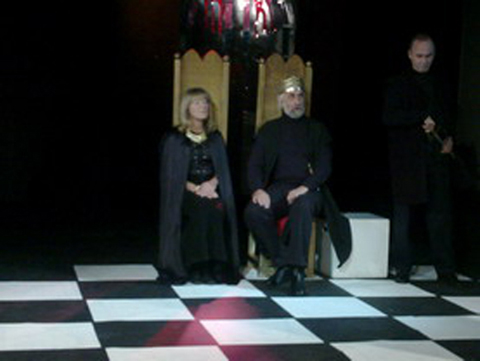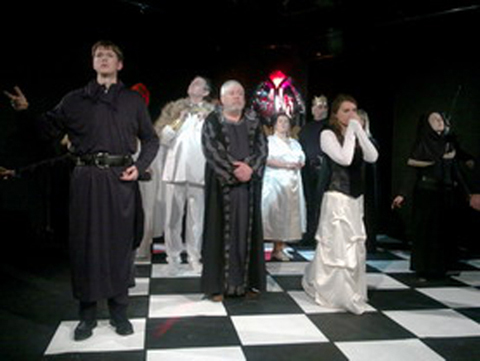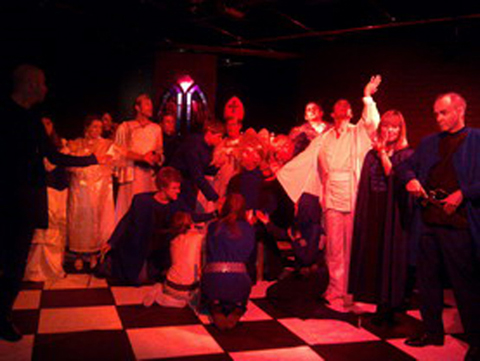- Accueil
- > L’Oeil du Spectateur
- > N°3 — Saison 2010-2011
- > Mise en scène de pièces de Shakespeare
- > King John directed by Stephen Challens The Brussels Shakespeare Society 12 November 2010
King John directed by Stephen Challens The Brussels Shakespeare Society 12 November 2010
The Warehouse Studio Theatre
Par Charles Holdefer
Publication en ligne le 14 janvier 2011
Table des matières
Texte intégral
1King John is rarely performed but it is an appropriate choice for the Brussels Shakespeare Society. The institutions of the European Union cast a long shadow in a nation whose own government has sometimes been notional. Brussels is a place of shifting alliances and factional fighting, where accusations of bad faith and executive incompetence figure largely in everyday conversation. Just like, one is tempted to say, the world of King John.
2Now in its 30th year, the Society is a non-profit amateur group performing several plays each season, working mainly out of the Warehouse Studio Theatre in the Schaerbeek district of Brussels. They have also given “alfresco” performances at castles in the Brussels area. Productions are in English but various nationalities are represented. Although it is an amateur organization, a sense of high standards is palpable1.
“Commodity, the bias of the world”
3Directed by Stephen Challens and produced by Joanna Jack, this King John emphasizes the calculations (and miscalculations) which determine political power. “Commodity” trumps principle, rules are of limited consequence and exist chiefly as possibilities to be manipulated. There is only one lasting value: survival.
4David Steen plays the lead and his interpretation of the King shows sensitivity and intelligence, particularly in how he charts the changes in the character. This is not a one-note reading. The wine-sipping, complacent monarch of the beginning of the play becomes increasingly perplexed and overwhelmed by events, and finds himself out of his depth, bewildered, and eventually full of reproach and self-pity. (“I beg cold comfort.”) Steen’s mature performance is never hysterical or flailing; he knows how to communicate the growing frustration of a gambler whose cards are slowly but surely becoming worse.
5On occasion, it might have been interesting to depict him as being more troubled or conflicted about his decisions – for instance, when he tells the horrified Hubert (here played with convincing world-weariness by Erik Maes) to murder young Arthur. (“He is a very serpent in my way.”) Still, Steen does a good job at making John’s follies and monstrosities seem, for his purposes, quite sensible.

David Steen and Marion Tomkins as King John and Queen Elinor.
Photo © Hazel Joanna Jack
6This sense of realpolitik is reinforced by the set design, credited to Challens and Jack. The stage is sparsely furnished, with only a pair of seldom-occupied, throne-like chairs and a stained-glass window in the background. The audience’s attention is drawn mainly to an open space of black-and-white squares, which are reminiscent of a chess board.
7Thus the moves, feints, and sacrifices of the characters are played out on this space, which evokes, inescapably, a game space of warfare. The characters’ costumes, too, in contrasting black and white like chess pieces (or, for the married Blanch, a hybrid version thereof), also contribute to the illusion.

Who will win “the match?” Note Jessica Howard, as Blanch, in both black and white.
Photo © Hazel Joanna Jack
8In another context, this chessboard conceit might appear as too reductive, but King John is a crowded, talky play with many characters, so this choice works well in establishing the conflicting interests and occasional claustrophobia of the principals. Perhaps the most effective use, though, occurs when Mark Prescott, playing the Bastard, has the stage to himself and jumps from square to square, crooning, “Mad world! Mad kings! Mad composition!”
9Prescott’s Bastard is stylishly black, unlike his more sober allies (he looks like the bouncer at an exclusive night club) and he inhabits the role with sly panache. On occasion he plays up the bluff, angry side of the character (for instance, his exasperation at the “saucy walls” of Angiers), but generally he opts for the waggish side and does not display his claws. His tweaking of Austria is more playful than menacing, and one could almost forget his motives of revenge. The famous “commodity” soliloquy is delivered engagingly, but the emphasis is on charm more than on vulnerability. It is, however, a convincing performance that serves as a reminder that it is a pity that King John is not staged more often.

Mark Prescott as The Bastard
Photo © Hazel Joanna Jack
“Nay, ask me if I can refrain from love”
10The cuts in the text (for instance, in the parley scene at Angiers, or in Pandulph’s speeches) are judicious because they maintain a coherent whole while keeping the performance at a manageable two hours. The battle scenes, with their “frozen tableau” technique, and the pre-recorded music, are less successful. It is perhaps a pet peeve of this reviewer, and examples of this problem can be found in companies with much higher budgets, but music thus filtered through sound systems often has a tinny, distracting quality. A simple horn or recorder or accordion can usually do the job better. The Warehouse Studio Theatre is an intimate space, and sometimes having so many people on stage at the same time dilutes the power of individual players. This is partly the point of King John – but it creates special challenges for the actors, keeping busy without creating an “anthill” effect.
11In more intimate scenes, however, the actors in supporting roles are generally solid. Marion Tomkins, in particular, stood out for her impressive stage presence in the role of Elinor. Isabel Walsh’s Constance was pleasing, too, and held her own in repartee with Elinor, but perhaps she could have been bitchier in the later scenes. The rivalry of these women to stake out territory for their offspring is one of the more interesting dynamics of the play.
12As for the other roles, Karl Keenan carries off the pomp of Pandulph, and Ignace de Volder successfully infuses the part of King Philip (arguably the least interesting character in the text) with an engaging, toothy energy. Jessica Howard’s Blanch, like Steen’s King John, effectively conveys an individual changing under pressure, and John Doy as Lewis the Dauphin is consistently good. His early rhetorical question in regard to his marriage with Blanch, “Nay, ask me if I can refrain from love?” echoes in a more general, ironical fashion as the story develops. Yes, the audience realizes, these competing and conniving personalities can refrain from love.
13The confrontation between Hubert and Arthur in Act IV is a challenging scene and Thomas Vercnocke, as Arthur, handles it with youthful energy, and hits the right note of pathos while Erik Maes, as Hubert, manages to make the onlooker feel sorry for him in his role as King John’s goon. Arthur’s leap, of course, is fiendishly difficult on any stage; the text offers no easy solutions. Director Challens’ choice to keep it simple is prudent and cannot be objected to, though it remains a moment in the play that could be open to more experimentation.
“I am a scribbled form, drawn with a pen / Upon a parchment”
14The performance began, before King John could utter the first lines, with a busy parade of the multitude of characters, thus impressing upon the audience in a simple and economical fashion the number of interests and factions involved. King John, the onlooker realizes, is about much more than King John. He inhabits a troubled, perhaps hopelessly complicated world.

A crowded world bathed in bloodlike light
Photo © Hazel Joanna Jack
15By the end of the play, John is dead, and his words cannot even bring him his “cold comfort.” He compares himself to a parchment against a fire. The futility of his enterprise is effectively brought home. The concluding tone in this production is appropriately more somber than tragic, and the Bastard’s final appeal for unity seems less a call to arms than a plea to avoid such waste.
16The Brussels Shakespeare Society’s King John is a rewarding production. Far from being a curiosity from an obscure corner of the canon, it is, by all appearances, the right play at the right time2.
Notes
1 Founded by Ian Flintoff, who was then a correspondent for The Guardian (and who later went on to act for the National Theatre, the RSC and the Old Vic), the Society began with volunteers giving group readings in a 30 seat theatre. Since then, it has grown and undertaken full productions of much of the Shakespeare canon, as well as more modern works by Lorca, Beckett and Stoppard. The current BSS chairman is Jonathan Goldsmith.
2 THE CAST:
King John: David Steen
Queen Elinor: Marion Tomkins
The Bastard: Mark Prescott
Constance: Isabel Walsh
Blanch: Jessica Howard
Sir Robert: Eduardo Aladro
King Philip: Ignace de Volder
Lewis: John Doy
Hubert: Erik Maes
Arthur: Thomas Vercnocke
Prince Henry: Sam Thomas
Austria: Martin Kirk
Salisbury: Ingemar Mikander
Pembroke: Charles Bouchard
Angiers: Sara Hammerton
Chatillon: Enrique Velazquez
Cardinal Pandulph: Karl Keenan
Queen of France & Melun/Prophet Messenger: Nicole Freund, Tetiana Dovganych
Lady Faulconbridge: Iona Hamilton
THE CREW:
Director: Stephen Challens
Producer: Joanna Jack
Stage Manager: Glenn Vaughan
Assistant to Director, Crew: Colum Hatchell, Johnny Mooney
Lighting Design: Jim McKenna
Lights: Barbara Daw, Robin Jezek
Sound: Lotte Lohausen
Props & Book: Andrea Theinert
Set: Stephen Challens, Joanna Jack
Costume: Stephen Challens
Box Office: Janet Middleton
Publicity: Deborah Griffith
Publicity Art: Anna Sparre